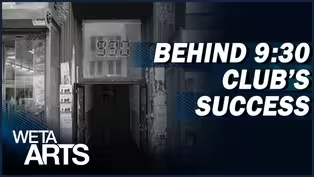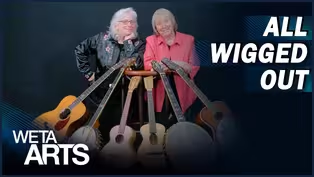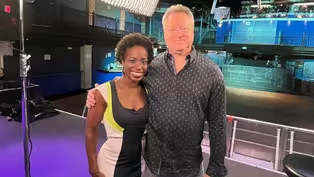
Street Photographer Ashley Tillery
Clip: Season 11 Episode 2 | 10m 25sVideo has Closed Captions
Discover the powerful world of street photography with Ashley Tillery.
Discover the powerful world of street photography with Ashley Tillery, a passionate photographer on a mission to capture and amplify images of the Black community in the vibrant streets of Washington, D.C. Join us as we follow her on a captivating July 4th shoot and explore her unique perspective on street portraiture.
Problems playing video? | Closed Captioning Feedback
Problems playing video? | Closed Captioning Feedback
WETA Arts is a local public television program presented by WETA

Street Photographer Ashley Tillery
Clip: Season 11 Episode 2 | 10m 25sVideo has Closed Captions
Discover the powerful world of street photography with Ashley Tillery, a passionate photographer on a mission to capture and amplify images of the Black community in the vibrant streets of Washington, D.C. Join us as we follow her on a captivating July 4th shoot and explore her unique perspective on street portraiture.
Problems playing video? | Closed Captioning Feedback
How to Watch WETA Arts
WETA Arts is available to stream on pbs.org and the free PBS App, available on iPhone, Apple TV, Android TV, Android smartphones, Amazon Fire TV, Amazon Fire Tablet, Roku, Samsung Smart TV, and Vizio.
Providing Support for PBS.org
Learn Moreabout PBS online sponsorshipshe found her calling.
She is capturing and amplifying images of the black community in the DC area.
To find out why, we followed her on a shoot on July 4th.
Woman: All right.
Tillery: And everybody get as close together as possible.
Tillery, voice-over: I'm a photographer, not by trade or anything, but just by passion.
The focus of my body of work is communities of color wherever I find them.
Tillery: Thank you, guys, so much.
Thank you!
Tillery, voice-over: I really focus on street portraiture.
[Camera shutter clicks] Street photography is a medium where you're looking for chance moments that are inherently ephemeral, and you're capturing them for future generations.
Can I get you guys right here?
Tillery, voice-over: With street photography, you have to show up as your authentic self because those interactions are sometimes very short.
It's like you guys have done this before.
[Both laugh] Tillery, voice-over: What you need to be a street photographer is you.
You and, obviously, a device to capture an image...
Stunning.
and when you are engaging somebody on a human level... And then you kinda look towards her.
it's an act of trust.
Perfect.
Thank you, guys, so much.
Tillery, voice-over: In portraiture, the photograph is not what happens in the camera.
[Camera shutter clicking] The photograph is what happens on either side of the camera.
It's a document of a human connection.
Curry: Tillery got lots of experience meeting new people while she was growing up.
She moved six times before she graduated high school.
Tillery: My mom's an attorney, and my dad's a retired colonel.
My growing-up experience as a person of color was actually very isolated.
Fast-forward to when I went to Tuskegee University.
I was immersed for the first time ever in a Black life.
I saw that there was more to the Black experience than either my parents or what was presented on the news at the time.
My parents got me these cameras, uh, because they wanted me to stop doing street photography because they thought it was dangerous.
Heh heh!
So they were like, "Hopefully, this would motivate her "to move into, like, just working in a studio, in a sanitized environment."
When people see a camera like this come out, people tend to become more wary.
All right.
It makes it a challenge to get the intimate shots that I really look for.
In some ways, shooting with a cell phone is the most American thing you can do.
A cell phone is a very democratizing piece of equipment, and anybody who has a phone has the opportunity to tell their story and to tell it honestly.
When I go taking pictures on a day like the 4th of July, what I'm looking for is the intersection of people and history.
[Camera shutter clicking] It's really important to go out there and capture images that provide narratives that tell more inclusive stories, more diverse stories that I think are truer to what it means to form a more perfect union.
We're going to start pretty near the, uh, Georgia-Petworth Metro station.
And Georgia Avenue has a tremendous amount of history.
You have the Sankofa bookstore over there.
You have the Howard Theatre.
You have Howard University itself.
And I wanted to know if I could take your portrait.
Tillery, voice-over: What I'm looking for in a subject, first and foremost, is something in our shared humanity and history that sets something off in me.
And where are you from?
DC?
Yes, I am.
Tillery, voice-over: The next thing is what type of backgrounds do I have to pull from here, and I guess the third thing is do they seem amenable to me asking them?
You have Frederick Douglass hair, which is very appropriate on the 4th of July.
Tillery, voice-over: I think, for photographers, Black photographers, especially... Look at me with your eyes.
[Click] photography can be a weapon.
It's a voice, it's an opportunity to say that the narratives that you present are not true and to reassert the place of African Americans in the American story, to put us in a narrative in a way that reflects our inherent dignity and worth.
So that's a large reason of why I take the, um, pictures I do.
In truth-- Hello.
I am so sorry to bother you.
I saw you walking down the street, and you are absolutely beautiful.
I know that's crazy to say to a man.
Do you mind if I take your portrait?
All right, cool.
And just stand forward in the door.
Awesome.
Tillery, voice-over: The stories sort of present themselves, especially when you're on Georgia Avenue, right?
I didn't even see your braces!
Tillery, voice-over: When we think about braces, we usually think about sort of an innocent time of life, so having him talk about being in jail, but also having those braces, I think it serves to humanize him and say, you know, maybe this person isn't as dangerous or menacing or whatever as the larger society may choose to view him.
I really appreciate you so much.
Thank you.
Curry: Tillery started street portraiture in response to the way photos of slain teenager Trayvon Martin were used by news outlets.
Tillery: What I found so disheartening was not only was this another Black boy gone, but how they chose to portray him in the media, and I started taking photographs of those individuals that I encountered in the neighborhood.
[Camera shutter clicking] And I think part of the exercise for me was processing the national moment that we found ourselves in.
And for me, during that time, it was not only asserting the value of Black life to myself, but raising the grandeur and inherent dignity of everyday life.
It is very important that we control our own images.
[Camera shutter clicking] Curry: Tillery displays her work in galleries on the Web and on Instagram.
Tillery: The point of putting the images on Instagram goes back to Frederick Douglass, of all people.
Frederick Douglass actually sat for a lot of portraits during his time.
And the reason he did that, according to him, is that what the camera sees is the truth, and so, when he would sit down and take those photographs, it was, in a way, calling everything else in the media landscape a lie.
[Camera shutter clicking] The point of posting the images to Instagram is to provide a counternarrative to much of what you see in the news and to ensure that people of color occupy the imagined spaces that are going to be created by AI.
AI's a technology that can only produce results based on what went before, and so I do think it's incredibly important to have a wide variety of images of people of color present on the internet, and so what I'm hoping is that the worlds that we create on the internet don't mirror the same historic inequalities that we've had in this world.
[Camera shutter clicks] It's participating in the dreaming and the narrative creation.
I am so sorry to bother you.
My name's Ashley.
I'm a photographer.
You look so cool.
Thank you.
Do you mind if I take your portrait?
Oh, sure.
It's always great when I meet someone like Angela, where all those various threads come together in a single person.
Not only was it the 4th of July, but this was a Black woman who owned a fireworks stand with her brother.
She was clearly very patriotic, but she was also wearing a "Black Lives Matter" T-shirt, right?
I hope the people who see the pictures stop and consider, "What do all these things mean together?"
On one hand, you want to celebrate liberty.
On the other hand, you realize that if you are not free to survive in your skin, that's not a form of liberty, and it's definitely not life or the pursuit of happiness.
Beautiful!
Now one with no smile, just... [Click] Tillery, voice-over: For me, street photography is not just taking pictures of people, but also better understanding myself and my history in the context of this great American experiment.
Ashley Tillery is a member of the DC Street Photography Collective, and you can see her work on their website, thedcspc.com.
And if you want to meet others discovering street photography, check out Exposed DC, which connects photographers of all levels with networking, mentoring, and exhibition opportunities at exposeddc.com.
Video has Closed Captions
Clip: S11 Ep2 | 9m 1s | Step back in time and dive into the rich history of D.C.'s 9:30 Club. (9m 1s)
Video has Closed Captions
Clip: S11 Ep2 | 7m 22s | A lighthearted yet poignant exploration of cancer by Marcy Marxer and Cathy Fink. (7m 22s)
Preview: WETA Arts October 2023
Preview: S11 Ep2 | 30s | Grammy-winning folk music duo’s cancer journey; street photography; 9:30 Club’s success (30s)
Providing Support for PBS.org
Learn Moreabout PBS online sponsorshipSupport for PBS provided by:
WETA Arts is a local public television program presented by WETA


















